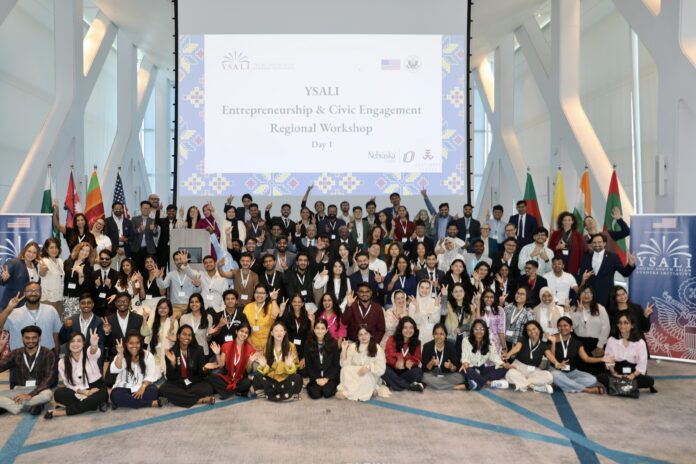By:Staff Writer
August 19, Colombo (LNW): Colombo this week became the center of a new United States initiative to cultivate the next generation of South Asian leaders, with the launch of the Young South Asian Leaders Initiative (YSALI). The three-day workshop, funded by the U.S. Department of State, brings together more than 80 youth leaders from Bangladesh, Bhutan, India, Maldives, Nepal, Pakistan, and Sri Lanka to strengthen regional networks and address shared challenges.
The program, inaugurated by U.S. Ambassador to Sri Lanka Julie Chung, Acting Deputy Assistant Secretary for South and Central Asian Affairs Shelly Seaver, and Sri Lanka’s Minister of Youth Affairs and Sports Sunil Gamage, is designed to foster leadership, entrepreneurship, and civic engagement. Participants were selected competitively from alumni of earlier U.S. government exchange initiatives and represent diverse fields including business, academia, health, and governance.
“Each of you has already demonstrated leadership through your participation in U.S. government exchange programs, taking the initiative to create change—often in challenging circumstances,” Ambassador Chung told participants. “Now, by coming together, you are combining your ideas, talents, and dreams to shape the future of this region. When you succeed, the Indo-Pacific becomes stronger, more connected, and more prosperous for all.”
Over the course of the workshop, attendees will engage with experts, government officials, and business representatives in interactive sessions designed to share U.S. expertise in leadership and innovation. A highlight of the program will be the YSALI Expo, where local organizations, American partners, and program alumni will showcase civic initiatives, entrepreneurial projects, and U.S. business engagement in the region.
The initiative aims to serve as a networking hub, encouraging collaboration among young leaders across national borders. By creating long-term professional ties, U.S. officials argue, the program not only builds leadership capacity within South Asia but also strengthens people-to-people connections that benefit both the region and the United States.
Launched in September 2024 on the sidelines of the UN General Assembly, YSALI is Washington’s newest youth engagement effort. It builds on earlier models, such as the Young Southeast Asian Leaders Initiative (YSEALI), and reflects a broader U.S. strategy to promote regional cooperation in the Indo-Pacific.
According to the U.S. Embassy, YSALI will provide young leaders with the tools, resources, and networks to tackle pressing issues such as economic development, climate change, and civic participation.
Analysts view the initiative as having dual benefits. For South Asian participants, it provides exposure to global best practices in entrepreneurship, governance, and social innovation, while offering opportunities for regional collaboration that might otherwise be difficult to access. For the United States, YSALI helps build enduring ties with future decision-makers, ensuring that American businesses and institutions remain active partners in South Asia’s growth story.
Critics, however, point out that such initiatives also serve U.S. strategic interests, positioning Washington as a key influencer in the Indo-Pacific at a time of growing geopolitical competition. While the workshops emphasize collaboration and empowerment, they also underscore the United States’ intent to deepen its soft power presence in the region.
Nonetheless, participants in Colombo voiced optimism that the program could create a platform for meaningful dialogue and shared action across borders. As one Sri Lankan attendee remarked, “This is a chance to learn from each other, collaborate across boundaries, and take small but important steps toward building a more connected South Asia.”
With regional cooperation increasingly essential in addressing economic and social challenges, the Colombo workshop signals both a commitment to youth empowerment and a reminder of the strategic role young leaders will play in shaping South Asia’s future.
